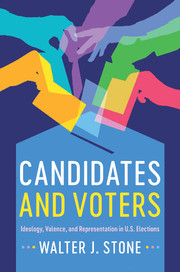Book contents
- Candidates and Voters
- Candidates and Voters
- Copyright page
- Dedication
- Contents
- Figures
- Tables
- Acknowledgments
- Introduction
- 1 Candidates, Voting Choice, and Election Outcomes
- 2 Design and Data
- 3 Polarization in Congressional Elections Since 1952
- 4 Ideological Proximity, Valence, and Voter Choice
- 5 Correct Voting on Proximity and Valence
- 6 Anticipated Reactions and Challenger Entry
- 7 The Proximity and Valence Rules in District Voting
- 8 District Ideological Representation
- 9 Getting it Right? Valence and Ideology in District Representation
- Conclusion
- Appendix Issues in the Use of Expert Informants
- References
- Index
Conclusion
Published online by Cambridge University Press: 29 July 2017
- Candidates and Voters
- Candidates and Voters
- Copyright page
- Dedication
- Contents
- Figures
- Tables
- Acknowledgments
- Introduction
- 1 Candidates, Voting Choice, and Election Outcomes
- 2 Design and Data
- 3 Polarization in Congressional Elections Since 1952
- 4 Ideological Proximity, Valence, and Voter Choice
- 5 Correct Voting on Proximity and Valence
- 6 Anticipated Reactions and Challenger Entry
- 7 The Proximity and Valence Rules in District Voting
- 8 District Ideological Representation
- 9 Getting it Right? Valence and Ideology in District Representation
- Conclusion
- Appendix Issues in the Use of Expert Informants
- References
- Index
Summary
- Type
- Chapter
- Information
- Candidates and VotersIdeology, Valence, and Representation in U.S Elections, pp. 185 - 204Publisher: Cambridge University PressPrint publication year: 2017



